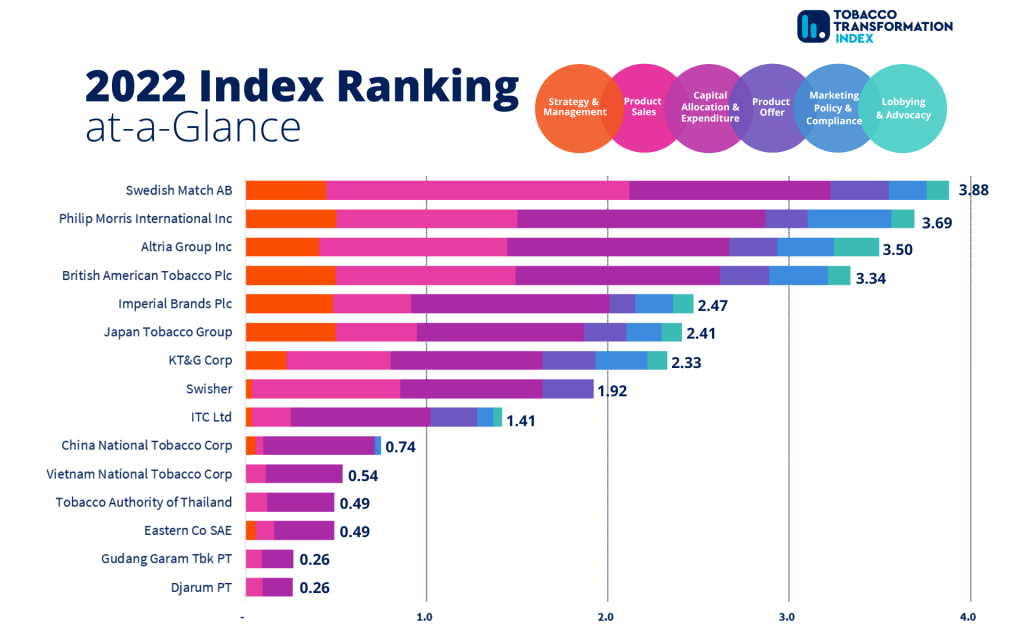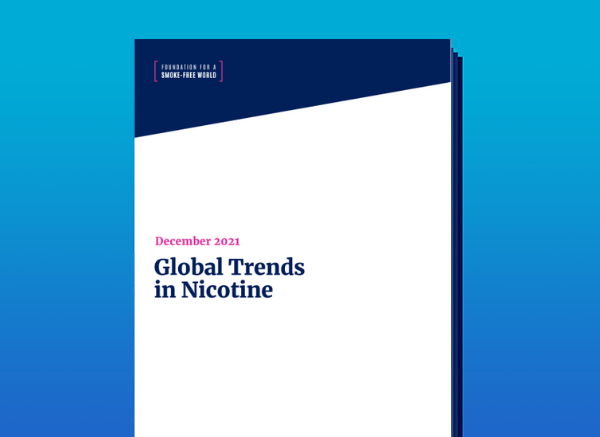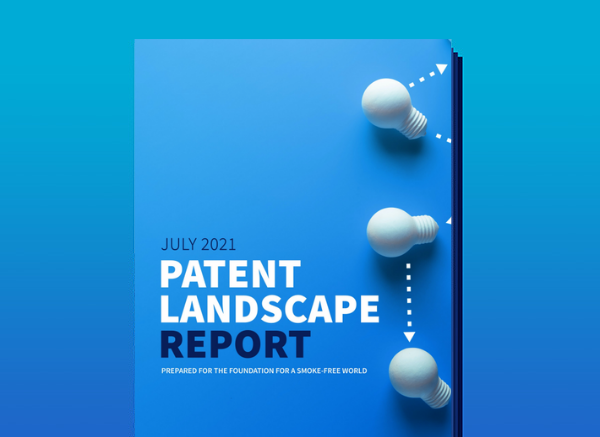IN SUPPORT OF ITS MISSION, THE FOUNDATION’S INDUSTRY TRANSFORMATION EFFORTS FOCUS ON ATTAINING CHANGE WITHIN THE GLOBAL TOBACCO INDUSTRY AND NICOTINE ECOSYSTEM.
The purpose of the Foundation for a Smoke-Free World is to improve global health by ending smoking in this generation. Our task is urgent. More than a billion people smoke worldwide, and more than eight million global deaths are attributed to tobacco use each year.

The Tobacco Transformation Index ®, which is the first action of the Foundation’s Industry Transformation initiative, aims to accelerate the reduction of harm caused by tobacco use. Specifically, the Tobacco Transformation Index ® evaluates 15 of the largest tobacco companies in the world on their relative progress, or lack thereof, toward harm reduction.

The Foundation’s Industry Transformation strategy aims to attain transformation, in support of its overarching purpose. The Tobacco Transformation Index ® is informed by, and seeks to build upon and complement, a variety of other global initiatives and reporting frameworks relevant to tobacco control, sustainability, and corporate accountability. The Foundation intends to complement other efforts by further examining the necessary future transformation of the tobacco industry and nicotine ecosystem, as well as by considering ways to change the core products that are responsible for preventable premature deaths and numerous diseases. The Index draws upon ideas developed by environmental, social, and governance (ESG) methodologies that have been applied to a diverse range of sectors.
To accomplish this undertaking successfully, the Index team has engaged extensively with stakeholders through a series of multi-stakeholder dialogues and will continue to do so. The sessions invited reactions and inputs regarding the feasibility and application of the Index, the specific topics it should address, and the measures necessary to ensure its research process and outputs would be perceived as objective, credible, and effective. The key takeaways and learnings informed the development of the Index design. The Tobacco Transformation Index ® promotes the development of metrics that investors and researchers understand, value, and utilize. The Foundation believes that the appropriate way to influence industry is indirectly through strategic partnerships. In particular, we believe the investor community is a powerful lever with which to influence company management.
The Index is a tool to accelerate the necessary transformation of the global tobacco industry for the benefit of public health. The Foundation believes that the forces of competition, differentiation, and constructive engagement are part of the solution, in addition to policy prescriptions. The record shows that implementation of policy strategies alone is not achieving the degree and speed in the reduction of the prevalence of cigarette smoking that is desired.
The Tobacco Transformation Index ® key premise is that by actively encouraging and monitoring the transformation, it will over time incentivize the tobacco companies to act more quickly and more responsibly than they otherwise would. Conversely, players that do not make the necessary transition rapidly enough will be exposed. As a result, all stakeholders will be better informed and able to demand necessary action.
The Foundation for a Smoke-Free World presents the second Tobacco Transformation Index®, building on the first edition released two years ago.
The 2020 index assesses the activities and performance of the world’s 15 most globally and regionally influential tobacco companies as they pertain to tobacco harm reduction. This includes analyzing and comparing companies’ respective product offerings, sales performance, and capital investments for both high-risk tobacco products and reduced-risk alternatives. The 2020 index also compares companies’ activities and performance across 36 countries.
Establishing a complete data set that encompasses the companies that produce nicotine-based products is a necessary precursor to developing effective policies which promote the Foundation’s purpose. The Global Trends in Nicotine reports represent an important component of the Foundation’s research program. Specifically, the reports identify the major players in nicotine delivery, outline their product organization and geographic focus, and quantify their output.

The Global Trends in Nicotine reports establish the groundwork for the Foundation for a Smoke-Free World in the area of industry transformation. The first Global Trends in Nicotine report was published based on data from 2017, with subsequent reports updating the record with data through 2020.
Many “dirty” and unhealthy industries are changing, by undergoing a transformation toward cleaner activities and products. One indication of the potential for change driven by innovation is the patent landscape pertaining to tobacco harm reduction technologies. Transformation of the tobacco industry can provide an enormous and crucial acceleration to the process of eliminating combustible tobacco.

This report presents an overview of the patent landscape for tobacco harm reduction technologies based on analysis of patent publication data from 2010 to 2020.
Research by leading international business and corporate governance scholar Daniel Malan identifies inherent conflicts of interest with many of the countries leading the development of global tobacco control policy. The “Contradictions and Conflicts” report finds that currently there are 18 countries in the world where governments own 10% or more of at least one tobacco company. Of these 18 countries, 17 are signatories to the FCTC, and of these, 8 countries own 100% of at least one tobacco company.
The “ Conflicts and Contradictions” report analyzes the fundamental conflicts among 17 governments that claim commitment to the World Health Organization’s (WHO) Framework Convention on Tobacco Control (FCTC), while also owning major stakes in tobacco companies.
© 2023 Foundation for a Smoke-Free World. All rights reserved.